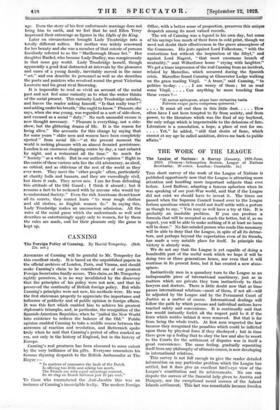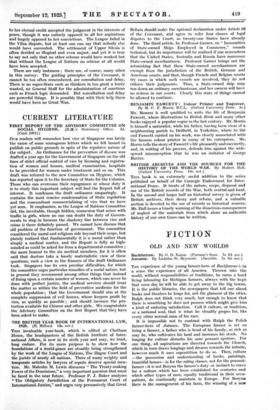THE WORK OF THE LEAGUE
The League of Nations : A. Survey (January, 1920-June, 1925) (Geneva : Information Section, League of Nations Secretariat. 20 cents. London: Constable. Is.) This short survey of the work of the League of Nations is published opportunely now that the League is attracting more attention and handling more important subjects than ever before. Lord Balfour, adapting a famous aphorism when he was speaking of our post-War world, said that if the League did not exist we should have to invent it. The times are passed when the Supreme Council tossed over to the League forlorn questions which it could not itself settle with a gesture as though to say, " You may as well have a try at this. It is probably an insoluble problem. If you can produce a formula that will be accepted so much the better, but if, as we expect, you will be able to make nothing of it at least no harm will be done." No fair-minded person who reads this summary will be able to deny that the League, in spite of all its detrac- tors, and perhaps beyond the expectation even of its friends, has made a very notable place for itself. In principle the victory is already won.
We do not say that the League is yet capable of doing a hundredth part of the useful work which we hope it will be doing two or three generations hence, nor even that it will continue in its present form, but it has created a new atmo- sphere.
Instinctively men in a quandary turn to the League as an indispensable piece of international machinery, just as in matters which are private they turn instinctively to their lawyers and doctors. There is little doubt now that as time passes international relations—most of them, if not all—will be adjusted by the League and by the Permanent Court of Justice as a matter of course. International dealings will follow the path by which persons and individual nations have reached safety and convenience. It is continually said that law would instantly forfeit all the respect paid to it if the force which resides behind it were removed. But that is far from being the whole truth. At first men respected the law because they recognized the penalties which could be inflicted upon them by physical force if they disobeyed ; but in time there grew up a feeling that to obey the law and also to resort to the Courts for the settlement of disputes was in itself a great convenience. The same feeling, gradually separating itself from any philosophy of ultimate causes, is now developing in international relations.
This survey is not full enough to give the reader detailed information on any particular problem which the League has settled, but it does give an excellent bird's-eye view of the League's constitution and its achievements. No one can dispute the success of the financial help given to Austria and Hungary, nor the exceptional moral success of the Aalaxid Islands settlement. This last was remarkable because Sweden to her eternal credit accepted the judgment in the interests of peace, though it was entirely opposed to all her aspirations and largely opposed to her convictions. The League failed in the Vilna dispute, but at least one can say that nobody else would have succeeded. The settlement of Upper Silesia is often derided as illogical and even unjust, and yet it is true to say not only that no other scheme would have worked but that without the League of Nations no scheme at all would have been accepted.
These are only instances ; there are, of course, many other in this survey. The guiding principles of the Covenant, it cannot be too often remembered, are consultation and delay. There is no super-State such as thinkers in too great a hurry wanted, no General Staff for the administration of sanctions such as French logic demanded. But consultation and delay are powerful things. It is possible that with their help there would have been no Great War.











































 Previous page
Previous page